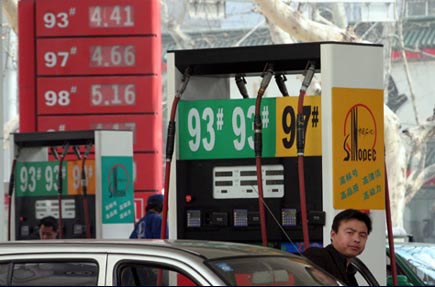Trade balance
The People's Bank of China said last week that the country will need up to
three years to achieve a trade balance. The surplus will be brought down by
means other than currency adjustments.
These expectations are based on a combination of measures China has started
to apply, including the expansion of domestic demand, the lowering of savings
rates, and the opening up of the market. The country has also floated the
exchange rate and increasing imports.
The United States might continue to incur large deficits even if China
manages to rebalance its global trade activities. It will be very difficult to
achieve a bilateral trade balance, the central bank said.
Oil prices

A driver waits to get his tark filled at a gas
station in Nanjing, East China's Jiangsu Province, March 26, 2006.
[newsphoto] |
China lifted its processed oil
prices last week to offset refinery losses and bring domestic prices closer to
international levels.
The National Development and Reform Commission said that ex-factory petroleum
prices rose 300 yuan (US$37.5) per ton, while the cost of diesel oil was up 200
yuan (US$24.9) a ton.
Retail prices for petrol rose 250 yuan (US$30.8) per ton, while diesel prices
increased 150 yuan (US$18.5) a ton.
The commission said the decision was made because the nation's processed oil
prices are significantly lower than on the international market.
Migrant workers
The rights of migrant workers should be respected and safeguarded, the State
Council said last week. Discriminatory regulations and systematic obstacles
should also be removed so former rural residents receive the same treatment as
their urban counterparts.
The Chinese cabinet said it is important to recognize and resolve the
problems faced by migrant labourers from rural areas, because these former
farmers have become an important source of manpower in the processing,
manufacturing, construction, and mining industries, as well as in the home
management and catering sectors.
The cabinet called for increased efforts to ensure rural labourers in cities
earn decent wages and are paid on time.
Organ ban
China's Ministry of Health issued a temporary regulation on human organ
transplants last week. It explicitly banned the sale of organs and introduced a
set of medical standards for organ transplants, in an effort to guarantee
medical safety and the health of patients.
Mao Qun'an, the ministry's spokesman, said that the temporary regulations ban
all forms of the organ trade, require medical institutions to obtain a written
agreement from donors before a transplant, and gives donors the right to refuse
to donate, even at the last minute.
The regulation, effective July 1, requires medical institutions to register
with provincial health departments.
Bribery crackdown
China will crack down on business-related bribery in the health sector to
ease public concern over expensive and difficult access to medical services,
Minister of Health Gao Qiang said last week.
Business-related bribes have made it increasingly difficult to deal with
problems in the public medical service sector, and have worsened the tense
relationship between patients and doctors, Gao said.
Some companies and individuals in China have offered money to health
officials and workers selling substandard drugs and medical equipment to
hospitals, resulting in a number of medical accidents.
Some doctors have used expensive drugs in treatment simply for personal
profit, putting patients at risk and stretching their finances to the limit.
This has led to public complaints.
Social security
The National Council for the Social Security Fund said last week that assets
in China's social security fund had reached 211.8 billion yuan (US$26.1 billion)
by the end of 2005.
The figure represents a year-on-year increase of 23.9 per cent, up 170.9
billion yuan (US$21.1 billion) from the same period the year before.
Xiang Huaicheng, chairman of the council, said the fund was created in 2000
as part of China's efforts to build a national social security network aimed at
handling the growing needs of its ageing population.
Pension asset increases include budgetary funding from the central
government, returns on investment, and revenue from the sale of shares in
State-owned enterprises listed overseas.
(For more biz stories, please visit Industry Updates)